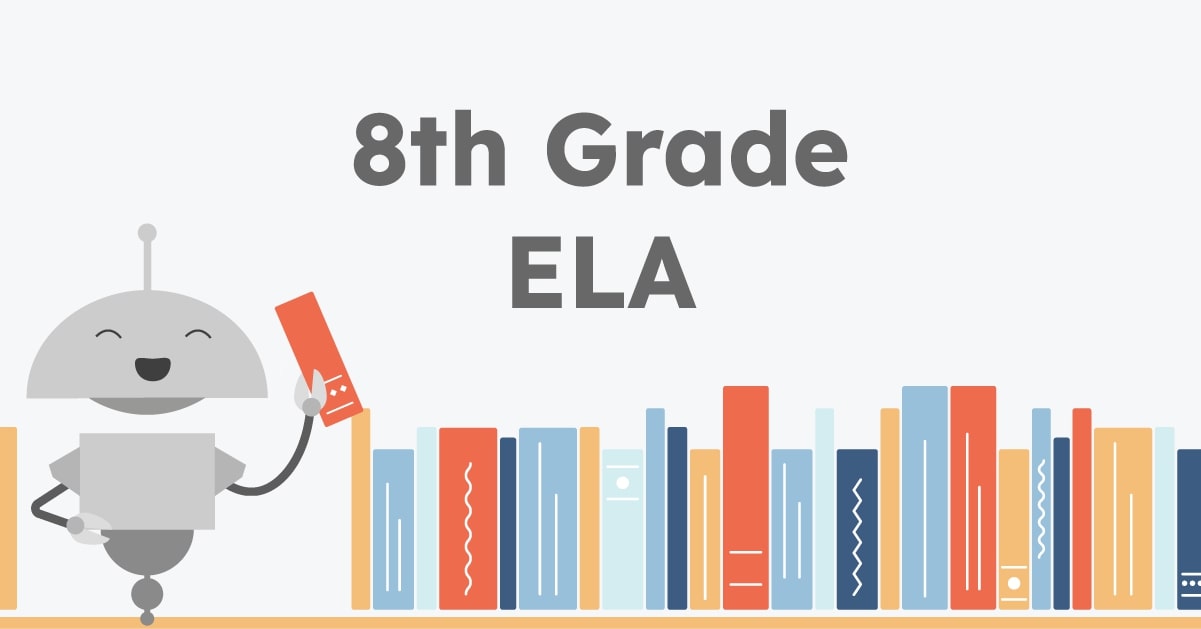8th Grade Language Arts Curriculum
Our eighth-grade language arts courses strengthen reading comprehension and writing skills through engaging, age-appropriate content. With Miacademy, students dive into a wide range of genres while building writing, analysis, and grammar skills — all in one place!
Sample Lesson
Interested in more eighth grade ELA videos? Visit our YouTube channel @TheMiacademyLearningChannel!
Is my student ready for 8th grade language arts?
Before working on eighth-grade reading and writing concepts, we recommend that your child complete our seventh-grade ELA courses.
Your student is likely ready for eighth-grade language arts if they demonstrate:
- Understanding of main idea and supporting details in longer passages
- Familiarity with literary elements such as plot, character, setting, theme, and point of view
- Exposure to a variety of genres, including poetry, narrative fiction, informational texts, and basic drama
- Ability to use context clues to determine word meaning
- Competence in paragraph writing, including topic sentences, supporting details, and transitions
- Experience writing different modes, such as personal narratives, opinion pieces, and informational essays
- Knowledge of grammar and sentence structure, including complete sentences, subject-verb agreement, and varied sentence beginnings
- Understanding of the writing process (planning, drafting, revising, and editing)
- Basic understanding of figurative language such as similes, metaphors, and personification
- Beginning awareness of bias or perspective in writing
- Familiarity with research basics, such as using multiple sources and identifying reliable information
Free ELA 8th Grade Worksheets – PDF Download
Each video lesson comes with an activity PDF to extend learning beyond the screen!
Click here to download a free sample PDF of our eighth-grade ELA worksheets:
What are the 8th grade ELA standards?
Eighth-grade language arts standards build upon existing skills to prepare students for high school and college. This year, students will practice crafting well-formed arguments, identifying bias, and practicing their research skills.
By the end of the eighth grade, students will be able to:
- Read and analyze texts from a wide array of genres
- Identify themes, main ideas, and key details in what they read
- Support their ideas with strong evidence from the text
- Understand and use figurative language and literary devices
- Expand vocabulary using context clues and word roots
- Write clear and organized essays, stories, and arguments
- Use correct grammar, punctuation, and sentence structure
- Conduct research using multiple reliable sources
- Present ideas clearly through writing and speaking
- Evaluate arguments and recognize bias or weak reasoning
- Plan, revise, and edit their own writing for clarity and impact
- Participate in group discussions and build on others’ ideas
Standards can vary by state, so be sure to check what’s required where you live.
Scope and Sequence
8th Grade — Language Arts Level I
This comprehensive course strengthens students’ reading, writing, and general language skills. Students sharpen reading comprehension and literary analysis while learning to write in a variety of formats, including descriptive, narrative, memoir, research-based, dramatic, and persuasive pieces.
The course also guides students in conducting effective research with reliable sources, building necessary skills for English classes at the high school and college level.
8th Grade — Reading Comprehension Level I
In Reading Comprehension, eighth graders study a mix of texts to build comprehension skills and check understanding with a short six-question quiz. It’s a great way to practice and strengthen what they’ve learned in their main language arts lessons.
Why is there more than one course?
Miacademy’s language arts curriculum is structured into three different courses, each that focus on a different set of skills:
Learn to Read (Levels A-C only): Focuses on letter sounds, rhyming, and common letter patterns to help kids practice reading for kindergarten to 2nd grade.
Language Skills (All levels): Covers comprehension strategies, grammar, and storytelling techniques to strengthen reading and writing.
Reading Comprehension (Levels C-I only): Provides weekly reading passages with questions to reinforce understanding and apply learned skills.
Students may work at different levels in each area to match their individual learning needs.
Our 8th Grade ELA Curriculum
Our middle school ELA courses give students the tools to become thoughtful readers and writers! By exploring a wide variety of texts and regularly applying what they’ve learned, students gain the skills and confidence to take on more advanced language challenges with clarity.
Plus, one of the best things about our eighth grade curriculum is homeschooling with flexibility! You get full customization over your lesson plans and assignments to fit your child’s unique learning needs. Students can skip what they already know and dive into new challenges!
Our family of accredited curricula covers everything from learning to read in elementary to analyzing literature in high school and adapts easily to different grade levels and learning styles.
Whether you’re a full-time homeschool parent or are looking to supplement a public school education, we’re here to support you! Wondering if Miacademy’s eighth grade homeschool curriculum can be a good fit for your student? Start a chat with one of our friendly customer service agents below! They’ll be happy to help you with any questions you may have.



